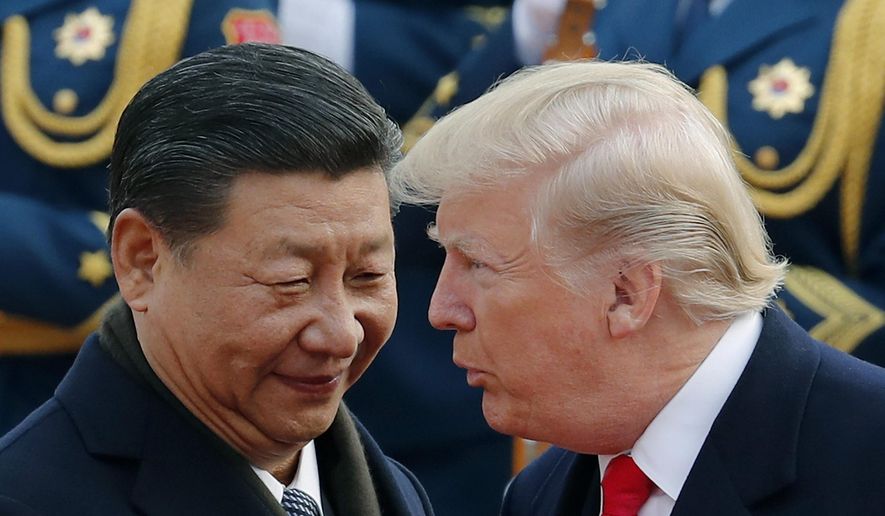President Trump said Tuesday he’s arranged for an “extended meeting” with Chinese President Xi Jinping next week at the Group of 20 summit, raising hopes on Wall Street and in Washington of a cease-fire in their escalating trade war.
The meeting between the two presidents, which hadn’t been scheduled, will focus on easing tensions that have been rising since a potential trade deal fell apart in May. Mr. Trump said the U.S. and Chinese teams will pave the way for negotiations before the summit, scheduled for June 28-29 in Osaka, Japan.
“Had a very good telephone conversation with President Xi of China,” Mr. Trump tweeted Tuesday morning as markets opened. Stocks rose about 1.35% on the development, with the Dow Jones Industrial Average climbing 353.01 points to close at 26.465.54.
“China wants a deal,” the president told reporters as he headed for Florida for the official launch rally of his reelection campaign.
But even as Mr. Trump announced a new opening for a possible agreement with China, the president also picked a fresh fight with the European Union over monetary policy. He criticized European Central Bank President Mario Draghi for considering more monetary stimulus in Europe, saying the move would make it easier for the EU to “compete against the USA” by weakening the euro against the dollar.
“They have been getting away with this for years, along with China and others,” Mr. Trump tweeted.
The meeting with Mr. Xi moved markets partly because there had been speculation that the Chinese leader would not even show up for the summit. The president’s announcement put that to rest, although his administration is downplaying hopes for a deal at the summit.
“Our position will continue to be we want structural changes here,” White House economic adviser Larry Kudlow told reporters. “We want structural changes on all the items — theft of [intellectual property], forced transfer of technology, cyber hacking, of course trade barriers. We’ve got to have something that’s enforceable. They’ll have a good conversation.”
China’s state broadcaster CCTV reported that Mr. Xi told Mr. Trump the bilateral relationship has “encountered some difficulties, which is not in the interest of either side.” Mr. Xi also told the president that “we also hope that the U.S. will treat Chinese companies fairly,” an apparent reference to recent U.S. actions against telecommunications giant Huawei over 5G networks’ security.
The two sides seemed close to a deal in mid-May, but the U.S. accused China of reneging on a commitment to enshrine into law any changes to its trade policy. Mr. Trump then slapped 25% tariffs on more than $200 billion worth of Chinese goods.
Beijing, which denied backing away from any commitments, retaliated with tariffs on U.S. goods, especially agricultural products. Mr. Trump approved a $16 billion bailout for U.S. farmers and said he is content to dig in with even more tariffs on nearly all Chinese imports.
That vow rattled the business community and lawmakers of both parties, because tariff costs often are passed on to companies and consumers.
At a hearing Tuesday, Sen. Ron Wyden, Oregon Democrat, told U.S. Trade Representative Robert E. Lighthizer that another round of tariffs would hurt families buying school supplies for the fall — “school uniforms, gym clothes, sneakers, book bags, pencils, notebooks, you name it.”
Mr. Lighthizer replied, “I would say to those college students that if China steals your intellectual property, you’re not going to have jobs in the future.”
Mr. Kudlow said the administration is “seeing evidence” that the tariff war is hurting China more than the U.S.
“American customers of China products don’t have to stay with China,” he said. “They can go to Vietnam, Bangladesh, Mexico and so forth. That’s where the economic burden falls most heavily on the Chinese. Their companies, they’re losing market share. A lot of importers in the U.S. go elsewhere.”
Mr. Trump also rebuked Mr. Draghi, who said in a speech in Portugal that he was open to printing more currency if Europe’s economy doesn’t improve. The move could result in interest-rate cuts and hurt the dollar relative to the euro, raising concern about a currency war in which both sides would lower their currencies’ value to seek a trade advantage.
The ECB is forecasting that economic growth will slide to 1.2% this year in the 19 countries that use the euro, compared with growth of 1.8% in 2018. The EU is grappling with the departure of Britain as a member by the end of October.
• Dave Boyer can be reached at dboyer@washingtontimes.com.
• Tom Howell Jr. can be reached at thowell@washingtontimes.com.




Please read our comment policy before commenting.